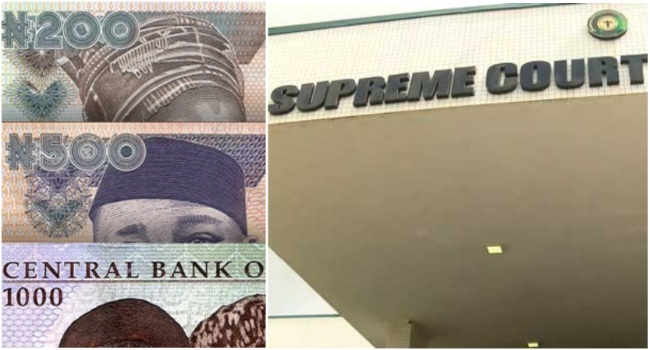Old Naira Notes Continue to be Legal Tender — Supreme Court
According to the Supreme Court, its February 8 judgment prohibiting the Federal Government and its agencies from enforcing the February 10 deadline for the usage of old 200, 500, and 1000 naira notes remains in effect.
The court issued the clarification on Wednesday in response to a complaint by Abdulhakeem Mustapha (SAN), a counsel for Kaduna, Kogi, and Zamfara states, that the Fed Govt and its agencies had failed to comply with the decision and had reportedly instructed the rejection of the old notes.
According to Mustapha, the plaintiff submitted a notice of noncompliance with the court order issued on February 8. And urged that the court take action against the respondent in order to defend the court’s dignity.
He added: “That order has been flouted by the government. We are talking of executive lawlessness here. We have filed an affidavit to that effect…We want the court to renew the order for parties to be properly guided.”
Justice John Okoro, who presided over a seven-member court panel, directed Mustapha to file a proper application in order to present his objections and allow the respondent to react appropriately.
The court’s order, according to Justice Okoro, does not need to be renewed.
He emphasized that because the court’s order on February 8 was made pending the conclusion of the plaintiff’s application for injunctions, the order still stands because the motion has yet to be considered.
The court had, in the February 8 ruling, said: “after a careful consideration of this ex-parte application, and the grounds in support of same, this court finds that there is real urgency for this court to intervene by the grant of this application.
“Accordingly, this application is hereby granted as prayed.
“That is to say, an order of interim injunction restraining the Federal Government of Nigeria, either by itself or acting through the Central Bank of Nigeria (CBN) and/or the commercial banks, its agents; agencies, corporations, ministries, parastatals, organizations or through any person or persons (natural and artificial) howsoever, from suspending or determining or ending on the 10th of February 2023 the timeframe within which the now older versions of the 200, 500 and 1000 denominations of the naira may no longer be legal tender, pending the hearing and determination of the plaintiffs/applicants’ motion on notice for interlocutory injunction.”
However, the Supreme Court has scheduled a hearing on February 22 for the action filed by Kaduna, Kogi, and Zamfara states contesting the constitutionality of the Federal Government’s naira swap scheme.
The court set the date after the Attorneys General of Katsina, Lagos, CR, Ondo, Ogun, Ekiti, and Sokoto states joined the earlier claim filed by Kaduna, Kogi, and Zamfara states as co-plaintiffs.
The Attorneys General of Edo and Bayelsa states were also named as co-respondents by the court. Both states chose to support the Attorney General of the Federation (AGF), who had been named as the single respondent.
The court directed that the individual petitions filed by Nasarawa, Rivers, and Kano states on the identical subject be combined with those made by Kaduna, Kogi, and Zamfara states.
The judge ordered that the essential paperwork be filed by next Wednesday’s hearing.
Before adjourning, Justice Okoro instructed the AGF’s lawyer, Kanu Agabi (SAN), to advise his client on how to assure the availability of cash for the people.
“Tell your client to let people have money. If they go to the ATM and the plaintiffs will come and withdraw the case. Make money available to the poor masses.
“You should know that a hungry man is an angry man. I say no more,” he said.
Agabi responded that Nigerians were merely blaming the government for their poverty.
“Many people don’t have money. They blame it on the Fed Govt and the AGF. I don’t have money too.
“Things have been bad for long. It is not today that the problems started,” Agabi said.
Governors Nasir El-Rufai of Kaduna and Yahaya Bello of Kogi states were in court to observe the proceedings.
Following the court proceedings, Bello stated that the states are not at odds with the Fed Government over its cashless policy, but are rather concerned about the detrimental impact on citizens who are now denied access to their funds.













